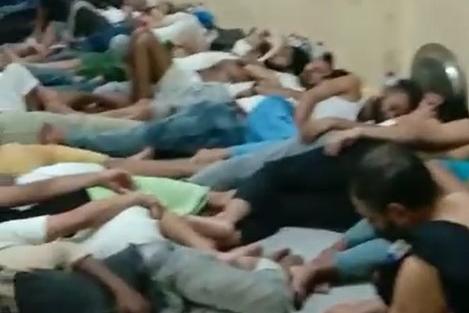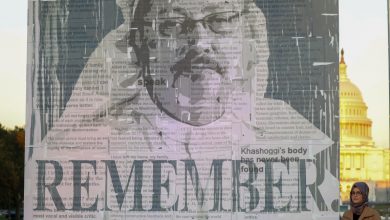Systematic arrests and violations against migrant centres in Saudi Arabia

The Middle East Eye revealed violations in migrant centres in Saudi Arabia, where thousands of people are arrested and deported from all over the kingdom.
The website mentioned in a report that the Saudi authorities are hiding the rampant abuses and deplorable conditions in immigration detention centres while continuing to detain thousands of African and Yemeni immigrants.
Ethiopian migrants awaiting deportation said Saudi authorities conducted mass searches of centres, confiscating phones and any devices that could be used to transmit images of their suffering to the outside world.
Human rights sources stated that the crackdown was an attempt to prevent broadcasting their conditions to the world during the month of Ramadan, which would risk criticism and uproar in the Islamic world during the holy month.
Police also ordered people to be deported to sign non-disclosure agreements preventing them from speaking to journalists about their experiences.
“They came here looking for phones because they don’t want the world to see pictures of our suffering here,” said Samir, an Ethiopian immigrant held in a deportation centre in Riyadh. “When they find a phone, they hit the owner with batons”.
The number of Ethiopian detainees in various immigration detention centers has increased in recent months. In an effort to ease the burden, Saudi authorities reached an agreement with Ethiopia in March to expel at least 100,000 Ethiopians, many of whom were detained in waves of crackdowns on migrants last year.
The Ethiopians in the centres told MEE that they were given little food and held for months in rooms crowded with corruption.
“People here are angry,” said Nabil, who is being held in Riyadh. There is little food, and many have not been out of their homes for almost nine months. We used to have a piece of bread three times a day. Since Ramadan, we only get it once at night.”
In 2020, smartphones smuggled into two immigration detention centres captured images of hundreds of emaciated African men, some seeming to die, in cramped neighbourhoods where sewage flows and disease spreads.
Rights groups emphasized that abuses and deaths were common in these centres, and in October 2020, the European Union Parliament passed a resolution condemning Saudi Arabia for its mistreatment of migrants.
The uproar eventually led to tens of thousands of migrants being repatriated throughout 2021, many of them struggling to deal with ongoing traumas.
But many stayed behind in facilities, as the Ethiopian government was preoccupied last year with the province’s civil war and the threat of rebel fighters attacking the capital.
Ultimately, the outcry of social media users and relatives in Ethiopia is believed to have prompted Ethiopian officials to send a high-level delegation to Riyadh earlier this year to begin negotiating the return of their citizens.
Since the agreement was signed in March, thousands of Ethiopians have returned to their homeland, and another 1,031 landed in the Ethiopian capital, Addis Ababa, on Wednesday.
However, mass arrests by Saudi authorities continued to target thousands more, with 15,000 migrants, mostly Ethiopians and Yemenis, detained in one week in March alone.
As a result, the detention centres have not been emptied, and violations continue, according to the detainees.
One of them told MEE: “This place is full of diseases. Everyone gets sick because they leave us to live and eat on the dirty floor and the stench of urine everywhere.”
The migrants’ statements about conditions in detention centres appear to be consistent with assessments by staff from the International Organization for Migration (IOM) and other UN agencies supporting relief efforts at return reception centres in Ethiopia.
“In addition to the injuries and illnesses she sustained due to the dangerous journey, IOM noted that infectious diseases, such as tuberculosis and skin diseases, are prevalent among the returnees,” said Yvonne Ndege, spokeswoman for the agency’s office in East Africa and the Horn of Africa.
“Long periods in crowded and unsanitary facilities may be a contributing factor to this problem,” she added.
The website spoke with nine inmates at Riyadh’s deportation centre and the notorious Shumaisi prison near Mecca. Detainees used cell phones without an internet connection that had survived the pre-Ramadan disinfection campaign.
“We were left here to rot,” said Ali, an immigrant at the Shumaisi centre. “Since they put me here, I have seen diplomats from Chad, Ghana and Somalia come to inquire about their compatriots. No one from the Ethiopian embassy has visited it even though Ethiopians are the majority here.”
Ali added that while beating migrants and poor sanitation has long been the norm, prison officials have begun extorting the families of detainees in recent months.
“Every week, the guards come here with what they call the market, bringing clean water, biscuits and other things from outside. We can only purchase these items by having our families transfer money to the personal accounts of guards and prison staff. But they charge us more than the price in the Saudi market, and they have a lot of money transferred to them in their pockets.”
Many of the detainees are among the tens of thousands estimated to travel each year along the extremely dangerous migrant corridor from East Africa, through the Red Sea, Yemen, and even Saudi Arabia. But others spent years living and working legally in the kingdom before they were arrested.




